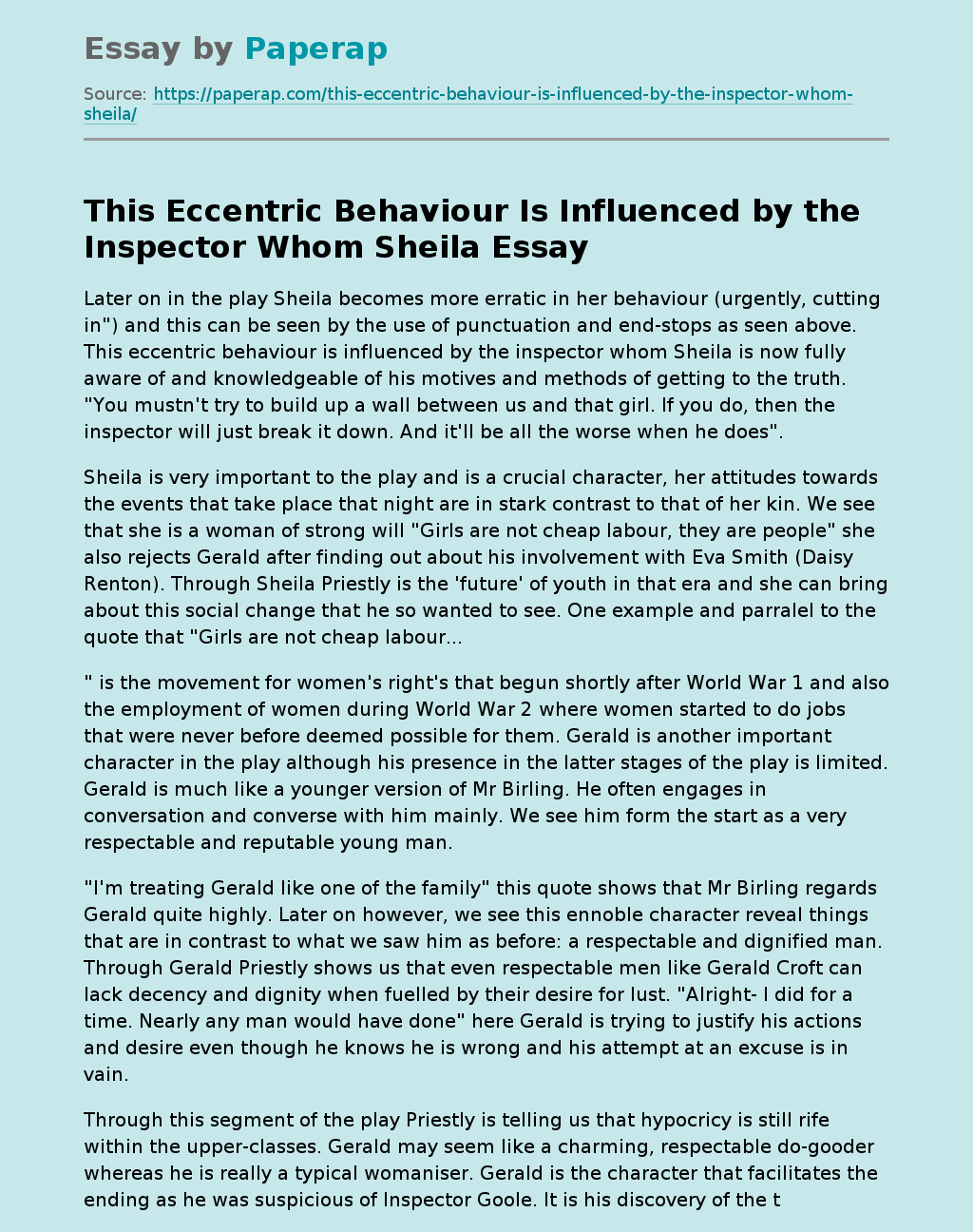“The Inspector’s Visit” Is One of Priestley’s Most Popular Action-packed Plays
Later on in the play Sheila becomes more erratic in her behaviour (urgently, cutting in”) and this can be seen by the use of punctuation and end-stops as seen above. This eccentric behaviour is influenced by the inspector whom Sheila is now fully aware of and knowledgeable of his motives and methods of getting to the truth. “You mustn’t try to build up a wall between us and that girl. If you do, then the inspector will just break it down.
And it’ll be all the worse when he does”.
Sheila is very important to the play and is a crucial character, her attitudes towards the events that take place that night are in stark contrast to that of her kin. We see that she is a woman of strong will “Girls are not cheap labour, they are people” she also rejects Gerald after finding out about his involvement with Eva Smith (Daisy Renton). Through Sheila Priestly is the ‘future’ of youth in that era and she can bring about this social change that he so wanted to see.
One example and parralel to the quote that “Girls are not cheap labour”.
Gerald is another important character in the play although his presence in the latter stages of the play is limited. Gerald is much like a younger version of Mr Birling. He often engages in conversation and converse with him mainly. We see him form the start as a very respectable and reputable young man.
“I’m treating Gerald like one of the family” this quote shows that Mr Birling regards Gerald quite highly.
Later on however, we see this ennoble character reveal things that are in contrast to what we saw him as before: a respectable and dignified man. Through Gerald Priestly shows us that even respectable men like Gerald Croft can lack decency and dignity when fuelled by their desire for lust. “Alright- I did for a time. Nearly any man would have done” here Gerald is trying to justify his actions and desire even though he knows he is wrong and his attempt at an excuse is in vain.
Through this segment of the play Priestly is telling us that hypocricy is still rife within the upper-classes. Gerald may seem like a charming, respectable do-gooder whereas he is really a typical womaniser. Gerald is the character that facilitates the ending as he was suspicious of Inspector Goole. It is his discovery of the truth that brings about and influences the ending. In this sense we learn that Gerald is a very clever young man. Through him the conclusion is built and we learn more of Eva Smith through his revelations.
Inspector Goole is the most intriguing character in the play, a sense of mystery and authority surround him and his presence is immediately effective and known to all. “He creates at once an impression of massiveness, solidity, and purposefulness… he speaks carefully, weightily” He enters at an important time just as this picture of an idyllic rich family is complete and on the surface all looks content in their world. So as he enters and gives the audience of subtle sense of foreboding. The inspector is by far the most important character in the play and he is instrumental in the plays development and outcome.
It can be said that the Inspector represents our conscience and the socialist views of Preistly. He asks the questions that may seem to be lingering in our minds whilst watching or reading the play but the also implements some of his won thoughts into the play. “There are a lot of young women living that sort of existence every day… If there weren’t, the factories and warehouses wouldn’t know where to look for cheap labour. Ask your father” in this quote Inspector Goole is telling us his view of the situation and what the real life situation was in those days to make us aware.
The inspector has prophet like qualities that portray all that is wrong with present society and he reminds us of the guilt, our family and conscience. “If men will not learn that lesson, then they will be taught in fire and blood and anguish. Good night. ” To ensure that the play was good and worked to a dramatic effect Preistly used the system of 3 unities, an ancient Greek method of writing plays, the 3 unities are time, it must happen in 24 hours, place, it must all happen in one place and of action, and no action should be superfluous to the play.
The structure and presentation of the play help convey the message because the audience are in a way subjected to the same treatment as the family. There are no intervals in the two and a half hour play and the timescale is also directionally proportional to what it is in the play. Two hours in the play is really two hours for the audience. This Play manages to hold onto the audience’s attention and fascination with an iron grip, which is matched only by the plays morality.
“The Inspector’s Visit” Is One of Priestley’s Most Popular Action-packed Plays. (2017, Oct 31). Retrieved from https://paperap.com/this-eccentric-behaviour-is-influenced-by-the-inspector-whom-sheila/

